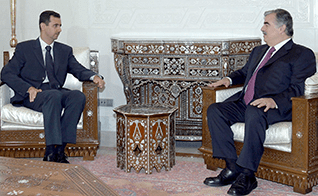One day after the assassination, the US ambassador to Syria, Margaret Scobey, was recalled ‘for urgent consultations’. A few days later she was withdrawn from Syria. This clearly indicated that Washington was blaming the attack on Syria before an inquiry had even started. Ten days later, on 25 January 2005, the UN Secretary-General sent a fact-finding mission to Beirut to look into the circumstances and consequences of the attack. The team, led by Peter Fitzgerald, arrived in Beirut on 25 February 2005 and delivered its report on 24 March 2005. The report recommended the establishment of an independent international investigation into the bomb attack.
In April 2005, the UN International Independent Investigation Commission (UNIIIC) was established by UN Security Council Resolution 1595, to help the Lebanese authorities in their investigation. Detlev Mehlis, a German Public Prosecutor, was appointed Commissioner of UNIIIC on 13 May 2005. The initial case made by the fact-finding mission was based on eye witness accounts. Testimonies implicating Syrian and Lebanese security officials led to the arrest and incarceration, for over four years, of Lebanon’s top four security generals: Brigadier General Jamil al-Sayyed, the head of the Lebanese General Security; General Ali al-Hajj, the head of the former Lebanese internal security forces; and General Raymond Azar, a former Lebanese military intelligence head officer. Mustafa Hamdan, the head of the Presidential Guard, turned himself in. A fifth former Lebanese security official, Ghassan Tufeili, was arrested later that year. All five had close ties with Syria.
UNIIIC’s first report, made public on 20 October 2005, concluded: ‘There is probable cause to believe that the decision to assassinate former Prime Minister Rafiq Hariri could not have been taken without the approval of top-ranked Syrian security officials and could not have been further organized without the collusion of their counterparts in the Lebanese security services.’ UNIIIC’s findings pointed towards Syria, and a follow-up report submitted on 12 December 2005 reinforced the conclusions of the first report, noting Syria’s ‘reluctance and procrastination’ in its cooperation with UNIIIC and several Syrian attempts to ‘hinder the investigation internally and procedurally’.
The UNIIIC was criticized for both its professional and ethical standards after UNIIIC Commissioner Detlev Mehlis leaked the names of 25 witnesses, including Gibran Tueni, who was assassinated six months after the disclosure. Surprisingly, Mehlis did not follow up possibly important leads, such as the question who owned the Japanese van carrying the deadly bomb, which, as it turned out, had been stolen months earlier in Tokyo and imported via one of the Gulf States. Within weeks of the release of the Mehlis report, the testimonies on which the allegations were based, were found to be unreliable. Leaked recordings of a meeting between the key witness and Rafik Hariri’s son Saad dealt an ultimate blow to the investigation.





